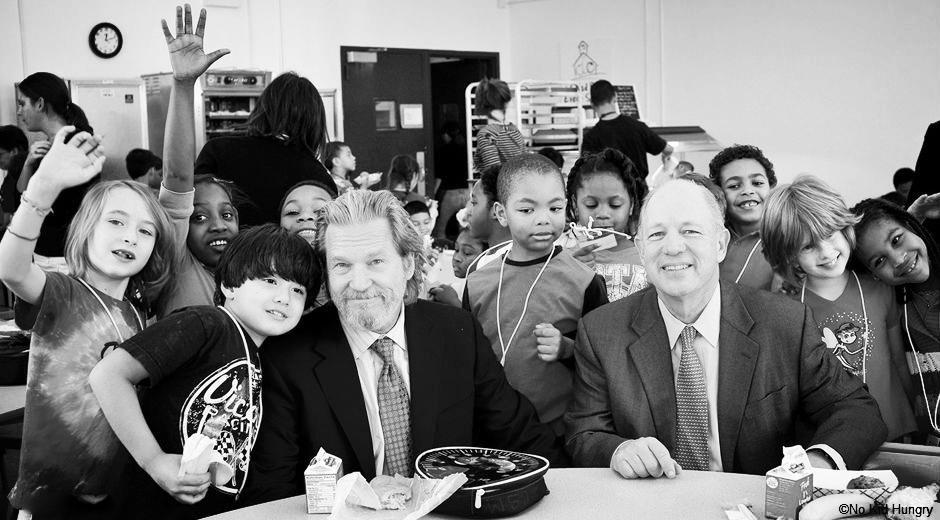The Rotarian Conversation: Jeff Bridges & Billy Shore
Thirty years ago, Billy Shore sat in bumper-to-bumper traffic in Washington, D.C., honking his horn. Shore, a young political operative, was in a hurry to save, or at least improve, the world. He hoped to help his boss, the idealistic Colorado senator Gary Hart, become the next president. His mission would fizzle when the press caught Hart monkeying around extramaritally, but that traffic jam helped improve the world anyway.
While stuck on the road, Shore glanced at that day’s Washington Post. A front-page story told of a famine in Africa and how it had inspired Band Aid, a supergroup of pop stars, to record “Do They Know It’s Christmas?” Eventually, that song would raise $24 million for famine relief and the stars would move on, taking the world’s spotlight with them. By the time Shore finished the article, however, he would be dedicated to blowing the horn on hunger.
He and his sister Debbie launched a charity, Share Our Strength, in 1984 with a $2,000 cash advance on Shore’s credit card. They cold-called senators, CEOs, and celebrities from a basement office on Capitol Hill. Writer Stephen King donated seed money. The siblings raised funds for food banks and other charities worldwide, but soon realized they were getting nowhere. “Our approach was clear, simple, and wrong,” Shore recalls.
The trouble was that hunger is a symptom of a larger problem: poverty. Handing out food is like putting a Band-Aid on a wound that won’t heal, Shore says. So he and his sister changed their approach. Convinced that a smart fighter “picks battles that are winnable,” Shore, the charity’s CEO, narrowed its focus to child hunger in America.
Since then, Share Our Strength has raised and invested more than $400 million in food-related anti-poverty efforts across the United States. U.S. News & World Report named Shore one of America’s best leaders – and that was before his group’s revenues jumped from $13 million in 2007 to over $40 million in 2013. Shore compares his mission to a football game: Keep gaining ground, and you’ll win in the end.
His biggest play so far was signing Oscar-winning actor Jeff Bridges to quarterback No Kid Hungry, a campaign that has helped feed millions of schoolchildren. The genial Bridges has dispensed breakfasts and hugs in elementary schools – and he has taken some flak for it too. Critics have called him unpatriotic for drawing attention to inequality in the United States. “That’s wrong,” says Bridges, who insists that his work is “very patriotic. Having one in five American children struggle with hunger, that’s unpatriotic.”
Bridges and Shore shared their hopes for No Kid Hungry.
THE ROTARIAN: How did you two join forces?
BRIDGES: Billy and I met five years ago, when I was part of a national hunger coalition. We were in Goleta, Calif., near my hometown of Santa Barbara, at a summer meals site [where kids can receive free meals when school’s not in session]. We started talking about how that program connected hungry kids to healthy meals, and we connected over the idea that childhood hunger is a solvable problem. Billy’s organization was just about to launch the No Kid Hungry campaign to end childhood hunger in America. We realized this was the time to team up.
TR: Of all the world’s problems and good causes, what drew you to this one?
SHORE: When my sister Debbie and I started Share Our Strength and began raising money in the mid-1980s, we invested it in nonprofits working to fight hunger. Pretty soon we had a powerful realization: Though our efforts were making a difference, we could be making a bigger, more transformational change. With the right strategy, we believed we could end childhood hunger in America. We have enough food in this country. All we needed was a plan to connect kids in need to the meals they need. That’s how No Kid Hungry was born.
BRIDGES: I’ve been advocating for children for more than 30 years. In 1984, I founded the End Hunger Network, a nonprofit dedicated to feeding children around the world. We produced the End Hunger Televent, a live TV broadcast focused on world hunger, with Gregory Peck, Jack Lemmon, Burt Lancaster, Bob Newhart, Kenny Loggins, and other stars. And I produced a film about hunger, Hidden in America, starring my brother, Beau. Then, around 2008, when things were getting tough here with the recession, I really focused on hunger in our own backyard. I couldn’t fathom that millions of kids in this rich country of ours can’t get enough to eat.
TR: When Americans think of hunger, they tend to think of starving people in the developing world. What is the face of child hunger in the United States?
SHORE: It’s a familiar face. It’s the little boy who sits near your son in homeroom. It’s the little girl on your daughter’s soccer team. It’s the family a few pews over from you in church. In the past, poverty was concentrated in specific neighborhoods. Today, poverty and hunger are spread across most American communities – suburbs and country towns as well as cities.
BRIDGES: The kids we’re trying to help may be in need, but they’ve got the same dreams as any child. They tell me they want to be doctors, architects, sportscasters, even president. That’s why it’s crucial that they get healthy meals every day – to compete with other kids and fulfill those dreams.
In a land of abundance, how can a child go hungry? We examined some of the numbers to deconstruct the issue. Read more.
TR: What are the biggest hurdles ahead?
SHORE: People see childhood hunger either as a nonexistent issue or as one that’s so large and intractable that it could never be solved. Over the past few years, there has been more awareness of the problem. It’s time to accelerate our work so that every boy or girl, no matter where they live in this nation, gets enough healthy food every single day. We need to build a network of business leaders, elected officials, school administrators, parents and caregivers, nonprofits and concerned citizens, dedicated to making real change.
TR: What encourages you about the near future?
SHORE: There’s momentum all across the country. Since 2010, more than two million kids have been added to the School Breakfast Program. Now, more than half the kids from low-income families are getting this critical meal before every school day. Kids often have a harder time getting the meals they need when school’s out for the summer, so we’re working with Congress on new policies to feed kids all summer.
BRIDGES: Look at Los Angeles: Three years ago, the city’s school district rolled out a plan to move school breakfast out of the cafeteria and serve it in the classroom in the first few minutes of the school day – one small change to make it easier for kids to get nutrition in the morning. When it started, only about 29 percent of kids from low-income families were eating breakfast in L.A. schools. By the end of this year, 9 out of 10 kids will be getting school breakfast. From 29 percent to 90 percent – that’s huge progress from one simple decision.
TR: How much difference can a school breakfast make?
BRIDGES: It’s true that breakfast is the most important meal of the day. We’re talking about brain food, man! I’ve heard so many stories about kids coming to school and the last food they ate was a school lunch the day before. When kids are focused on how much their stomachs are growling, how can they focus on algebra? Teachers tell us that when kids haven’t eaten, they have trouble settling down and behaving, or they get stomachaches or headaches and go to the nurse’s office. Add it all up: If you come to school hungry, you won’t learn as much.
The way I see it, making sure kids eat breakfast is an investment in our country’s future. When kids get enough to eat, they feel better. They learn more. They grow up stronger and smarter. The No. 1 thing we can do right now is make breakfast a part of the school day in low-income schools. Not before school, but after the first-period bell. That way, kids don’t have to worry about getting to school early. They don’t get picked on for being “the poor kid” eating a free breakfast in the cafeteria. Everyone gets something to eat at the start of homeroom or first period.
SHORE: There’s another benefit: What we’re doing is good for the nation’s whole political system. Our successes can help reverse people’s plunging confidence in government. When our leaders help us reach America’s most vulnerable children, it shows we have a shot at restoring a key ingredient of the American dream: the idea that the next generation will be better off than our own.
TR: Which moments in your anti-hunger work stand out to you?
BRIDGES: Last year, I met with a group of school superintendents in Arkansas. I challenged them to look for innovative ways to help hungry students get the nutrition they need. As a result of our meeting, the Arkansas No Kid Hungry campaign has led more than 400 schools to serve breakfast after the official start of the school day. Thousands more kids in that state are getting the breakfasts they need.
I’ve also been moved by the work we’re doing in Santa Barbara, where I live. Nearly a quarter of the kids in my hometown struggle with getting enough to eat when school is out. We’ve been putting on a series of concerts by local youth bands at summer meals sites there to build awareness of the program.
TR: Jeff, plenty of celebrities lend their voices and names to worthy causes. But you’ve criss-crossed the country, meeting with school superintendents, mayors, and governors to talk to them about school breakfasts.
BRIDGES: Well, I didn’t want to dabble. I wanted to help start a movement. To do that, I had to figure out what would be the best use of my time. I have a platform – I’m always talking to the media – so why not use that platform to motivate and educate people? And I’ve found that school administrators, mayors, and governors want to hear what I have to say. When Billy Shore and I meet with them, they’re amazed by the progress we are making in other cities and states, and they don’t want to be left behind. I’ve met with the governors of Montana, Colorado, Maryland, Virginia, Washington, Oregon, Nevada, and Arkansas. I hope to meet with California Governor Jerry Brown and Mayor Bill de Blasio of New York City to encourage them to bring our Breakfast in the Classroom program to their communities.
TR: Billy, is there more to ending hunger than feeding people?
SHORE: Yes, it’s a question of sustainability. Feeding people ends their hunger for the course of a meal or a day. Ending hunger means putting a system in place to ensure that all children get the three meals they need every day. It’s the difference between a Band-Aid and a cure.
TR: How can people help you?
SHORE: They can go to nokidhungry.org to join the No Kid Hungry network. They can take our No Kid Hungry pledge, support our work, and bring new awareness of the issue to their hometowns. We hope they will.
Originally appeared in The Rotarian magazine on May 2015.


